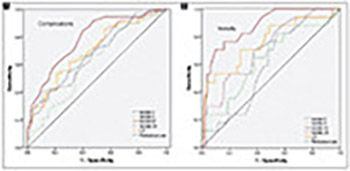The association of early postoperative lactate levels with morbidity after elective major abdominal surgery
DOI:
https://doi.org/10.17305/bjbms.2018.3186Keywords:
Elective surgery, major abdominal surgery, lactate, postoperative complications, in-hospital mortality, surgical intensive careAbstract
Lactate levels are widely used as an indicator of outcome in critically ill patients. We investigated the prognostic value of postoperative lactate levels for postoperative complications (POCs), mortality and length of hospital stay after elective major abdominal surgery. A total of 195 patients were prospectively evaluated. Lactate levels were assessed on admission to the intensive care unit (ICU) [L0], at 4 hours (L4), 12 hours (L12), and 24 hours (L24) after the operation. Demographic and perioperative clinical data were collected. Patients were monitored for complications until discharge or death. Receiver operating characteristic (ROC) curves were used to determine the predictive value of lactate levels for postoperative outcomes. The best cut-off lactate values were calculated to differentiate between patients with and without complications, and outcomes in patients with lactate levels above and below the cut-off thresholds were compared. Univariate and multivariate analyses were used to identify variables associated with POCs and mortality. Seventy-six patients developed 184 complications (18 deaths), while 119 had no complications. Serum lactate levels were higher in patients with complications at all time points compared to those without complications (p < 0.001). L12 had the highest predictive value for complications (AUROC12 = 0.787; 95% CI: 0.719–0.854; p < 0.001) and mortality (AUROC12 = 0.872; 95% CI: 0.794–0.950; p < 0.001). The best L12 cut-off value for complications and mortality was 1.35 mmol/l and 1.85 mmol/l, respectively. Multivariate analysis revealed that L12 ≥ 1.35 mmol/l was an independent predictor of postoperative morbidity (OR 2.58; 95% CI 1.27–5.24, p = 0.001). L24 was predictive of POCs after major abdominal surgery. L12 had the best power to discriminate between patients with and without POCs and was associated with a longer hospital stay.
Citations
Downloads

Downloads
Additional Files
Published
Issue
Section
Categories
How to Cite
Accepted 2018-04-01
Published 2019-02-12









